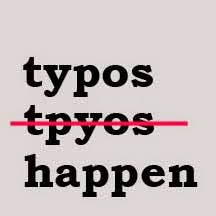| Online: | |
| Visits: | |
| Stories: |
How to Err…and Correct
Wednesday, October 8, 2014 2:45
% of readers think this story is Fact. Add your two cents.
 |
| Graphic credit | EKHumphrey |
This week, typos seem to be everywhere. I don’t know if I’m in a typo-seeing mode or just that there are more errors cropping up this week. Whatever the reason, I also ran across a nice postabout whether or not you should point out typos. I’ve read several professional communications this week with countless problems.
I believe a reader is more than welcome to point out an error or a typo or even a word usage problem. But do it nicely. We all make mistakes. (Yes, even those of you who don’t admit to making mistakes.) And, every once in a long while, everyone is entitled to typing their when she actually means there or they're…particularly those who type faster than their brain can keep up with.
I know that I’ve even been known to have some typos in my posts here. For that I apologize. I’ve worked on thousands of pieces of writing throughout my life and even with the best intentions for perfect prose, errors slip through.
So, consider that you are the writer and you’ve polished your prose. When you click the button to publish it, you consider it complete. Your writing goes into the world and you expect the best.
Your reader reads it. She stumbles over a word and realizes you transposed a couple of letters.
Now, many people might just read over that and think nothing of it. Some will be determined to point out the error while others might read over the error and think less of the writer. This is where it can all go wrong. If the reader thinks less of the writer, there is a chance that attitude will color the reader’s contact with the writer.
In all my years of writing online, I can’t remember the number of positive interactions with readers. But I’m able to recite the negative ones. Unfortunately, the negative responses seem to stick longer in our memory than the positive ones. That doesn’t mean that a writer doesn’t appreciate the positive feedback. For me, it means that I continue to beat up myself over the error that I let slip through and vow that I’ll never let that happen again. So I remember…and make another mistake.
When you are engaging with the writer, remember that the writing took some time. In fact, the time and energy put into a piece more often than not involves the writer’s personal energy. Consider how you like to be approached with criticism and reflect that in your dealings with others. Approach the writer as you would hope someone would approach you. It helps to kick off the note with a positive about the piece or the writer. Be kind and maybe add a bit of humor. But don't tell the writer she's an idiot or behave holier than the author.
Just remember, mistakes happeneven to the best of us. And you might be the one who errs next.
Do you think you should point out errors in someone else’s writing? What error in your writing left you with a lesson you learned about your own writing? What’s the best experience you’ve had with a typo or error in your writing?
Elizabeth King Humphrey is a writer and editor living in North Carolina. She will be baking a mountain of cake balls today but wishing she was searching for writing errors.
(C) Copyright wow-womenonwriting.com
Visit WOW! Women On Writing for lively interviews and how-tos. Check out WOW!'s Classroom and learn something new. Find jobs on the Freelance Job Board. Enter the Quarterly Flash Fiction Contest. Open Now!
Source:




